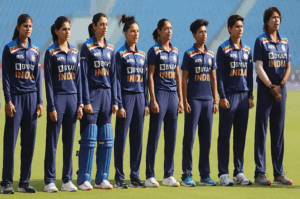Mihir Vasavda at Asian Games: Gymnast Oksana Chusovitina, 48 and shooter Al Rashidi, 60, play dazzle of the ancients

The Uzbeki vaulter made young gymnasts nervous with her impeccable routine, finishing fourth ultimately while the skeet shooter went all the way, winning a gold.
Winners don’t always come draped in gold, silver or bronze. They aren’t always women and men in the prime of their youth, celebrated for their otherworldly athletic abilities.
Victory is also being a gymnast nearing the age of 50, challenging teenage girls with elastic bodies and scaring the living daylights out of them by almost vaulting onto the podium. Triumph is also in the resounding ovation even when not being on the podium.
Oksana Chusovitina did not win a gymnastics medal. Competing in a vault final where the average age of her opponents was around 19 or 20 (except India’s Pranati Nayak, who is 28), the Uzbek legend finished fourth.
But the paraphernalia doesn’t excite her as much as pushing competitors young enough to be her daughters and testing her own limit in a sport where bodies fly and 25 is considered to be ancient.
In a Games for Gen Z, where 9-year-olds are skating to stardom and gamers are the new superstars, Oksana is fighting for the older generation. “I feel wonderful,” she said after finishing fourth in the women’s vault final. “I still have more strength.”
Oksana isn’t the only one in this.
A day earlier, at the shooting ranges, a 60-year-old and a 52-year-old were locked in an engaging battle to stop a 25-year-old from finishing on top of the podium.
Abdullah Al Rashidi is old enough to be a grandad to many competing in Hangzhou. But the sharpness of his eyesight and the fluid hand-eye coordination would put many young people to shame.
In skeet shooting – an event that’s a sensory delight with two flying targets being launched from opposite ends, from different and varying heights have to be shot down within seconds – the 60-year-old shot down 60 out of 60 clay birds. “This happens when you play every day, you exercise, go swimming, and eat well,” Al Rashidi said.
Unlike Oksana, Al Rashidi won the gold medal. But like her, he isn’t done challenging the youth. Sixty might be a retirement age in most professions. But the Kuwaiti isn’t big on following the conventional path. “Inshallah, we have time to shoot the next two Olympics,” he wished.
Oksana and Al Rashidi are on the opposite end of the spectrum of a sporting world that’s pivoting dramatically towards the youth; where 13 and 15-year-old athletes have won gold medals and where short, unathletic events that appeal to teenagers are making maiden appearances.
Al Rashidi reminds that despite all this, there’s no substitute for old-fashioned ways.
“You keep your body strong. I don’t look at the telephone or Twitter, because this is not good for your eyes. I look after my body and my health, and I go to sleep early and wake up early. I make a good but difficult training programme, to look to the future,” he said.
Oksana isn’t as upfront about her routine as Al Rashidi. But she is a woman full of wonderful contradictions.
For a petite gymnast, she is married to a burly wrestler, Bakhodir Kurbanov a Greco-Roman specialist who has competed in two Olympics. The 48-year-old, who once claimed to be a ‘strict’ mother, had posters of Tom Cruise plastered on her bedroom wall.
She has represented the Soviet Union, Uzbekistan and Germany at the Olympics, World Championships and other major events. And in a sport that’s seemingly custom-made for the youth, with its punishing routines and heavy toll on the body, the eight-time Olympian continues to flourish against girls who weren’t even born when she won her first major medal, a team gold at 1992 Olympics.
Born in Uzbekistan, Oksana was a rising star when the USSR collapsed but she helped the Unified Team win a gold medal at the Barcelona Games in 1992. The Soviets may have fallen but the precision of their sporting system ensured Oksana, who began to represent Uzbekistan, never slowed down.
The gymnast moved to Germany at the turn of the century for the treatment of her son Alisher, who was diagnosed with cancer. To pay the bills, she began competing for a club team in Cologne. After Alisher fully recovered, Oksana offered to join the German team as a sign of gratitude.
She was 33 but the Germans welcomed her with open arms and she repaid their faith by winning the silver on vault at the Beijing Olympics. Oksana returned to playing for Uzbekistan in 2013 and has medalled almost at every major event since then.
The Hangzhou Asiad is a rare miss. But it barely put a dent in her popularity. The short walk from the field of play to the changing room, an area that’s called the mixed zone where athletes mingle with journalists, was a good enough indication.
Swarmed by the world’s media, it took Oksana nearly 45 minutes to walk through the 20m zone after a final that got over in 30 minutes. She answered every question politely in broken English and Russian. But frowned when someone mentioned the ‘R’ word.
“I am not talking about retirement,” she snapped.
They may or may not win medals. But the golden oldies of world sport are going nowhere.






